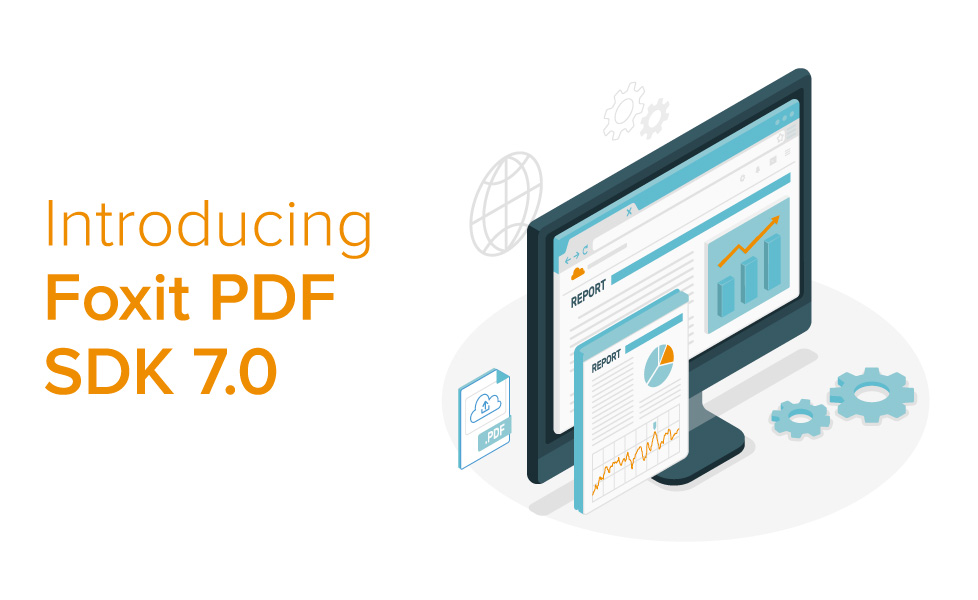Introducing Foxit PDF SDK 7.0

The latest Foxit PDF SDK is here! Our brand-new update is the biggest one yet and comes jam-packed with loads of new features, enhancements and further upgrades. Read on below as we take a deep dive into the update.
Highlights:
- .NET CORE SUPPORT
- PAdES SIGNATURES AND LONG-TERM VALIDATION (LTV)
- PDF TO HTML CONVERSION ADD-ON
- 22 NEW JAVASCRIPT METHODS AND PROPERTIES
Contents
VIEW THE RELEASE PAGE HERE
.Net Core support
The same functionality already available on other PDF SDK platforms is now available on .NET Core. The open source framework is ideal for those who develop apps on Windows, Linux, and Mac operating systems. With its high-performance and scalable system, .NET Core is the future of the .NET framework and you can develop your apps now with PDF SDK 7.0.
The work on .NET Core in Foxit PDF SDK is ongoing and will continually improve with the development of the framework itself. Foxit gives you the opportunity to start or migrate your .NET Core document management using our PDF technology from the start.
PAdES Signatures and Long-Term Validation
Signatures are Foxit PDF SDK’s industry-leading area of expertise. We pride ourselves on having the most advanced PDF SDK for signing, viewing and rendering signatures in the market. With version 7.0 of Foxit PDF SDK, we have introduced support for PAdES (PDF Advanced Electronic Signatures). PAdES are extremely useful because of the number of objects and properties it can support. Currently, the supported level of PAdES profiles provided by Foxit PDF SDK are:
- PAdES B: Basic Signature
- PAdES BES: Basic Enhanced Signatures
- PAdES EPES: Explicit Policy Enhanced Signatures
- PAdES LTV: Long-Term Validation
Supporting LTV-enabled signatures helps you deal with a series of archiving, compliance and legal issues when signing contracts, forms and any type of PDF. Foxit’s digital signature technology also allows users to append multiple timestamps and signature validation protocol data on the signatures applied in the PDF. This can be repeatedly done, even when you apply more advanced keys and certificates that the PDF will be able to store in the signature as well. This means you can validate a signature even when the certificate has expired/been revoked by your certificate authority and display an advanced chain of signing security history.
Foxit PDF SDK 7.0 goes head-to-head against PDF signing tools with next-level digital signatures while also providing you the most powerful viewing and rendering SDK on the market.
Take a look at our LTV enabled signature technology on a mobile in the video below:
PDF to HTML conversion add-on
PDF SDK 7.0’s powerful engine can now convert HTML to PDF for Windows/Mac with lots of features included. Here are just some of the things you can do with the HTML to PDF conversion add-on:
- Retain the tags from HTML pages
- Set paper size
- Set margins
- Rotate the document
- Convert links
- Set timeouts
- Set cookie paths
- View in single/multiple page format and much more
- Command line calls also supported (batch conversion of HTML to PDF documents)
There’s no action needed from the user (Save as PDF, Create PDF, Convert to PDF). With Foxit PDF SDK you have the option of doing it all in the background and choosing the automatic event to trigger conversions.
The PDF text generated is also fully interactive and editable. That means you can redact your PDF’s text automatically (signatures, sensitive form field info such as SSN and credit card information), add links to other pages, PDFs and websites, perform full-text search and obtain whatever key information you require. On the security side, SHA-256 encrypts your converted HTML PDFs and makes them available on your server with password protection.
Transform your signed and submitted web-based forms into perfectly rendered PDFs in seconds without changing formatting and visual aspects.
See our rendering power below vs Adobe:
Foxit HTML conversion output
Adobe HTML conversion output
New JavaScript methods and properties
The JavaScript functionality has been expanded in Foxit PDF SDK 7.0, providing new methods and properties focused on annotations. You are now able to add new annotations through a JavaScript, as well as retrieve single and multiple annotations properties using getAnnot and getAnnot methods.
In terms of properties, there is an array of new functionality available for customizing your annotations design such as type, opacity, fill and stroke color, textsize, alignment, rotate, setting read only state and much more. This is an exciting new functionality added to the previous form-related JavaScript methods.
Now you can not only work on your PDF forms in JavaScript, but also annotate your PDFs with easily transferable JavaScript code!
Mobile UI upgrades
At the mobile UI level, you can now compare PDF documents on a page by page basis to show side by side visual differences, as well as comparisons of text, images, annotations, paths, and shading.
With annotations, you can now redact at the UI level too. We’ve also added support for form field creation at the UI level for text, check boxes, signature fields and more.
For the search functionality UI, there are 3 added options for searching:
- Case sensitive
Match case-sensitively - Whole words only
Match the entire word - Search on the Internet
Jump to the browser to search
Finally, there’s support added to get/set the current UI language, as well as Localization tool classes to get/set the current UI language.
We’ve also updated the documentation to provide guides on converting from HTML to PDF, .NET Core, PDF document optimization, using Long-Term Validation of signatures, changing the UI for Cordova, localization settings for Android, and reducing the size of the APK for Android. View our updated documentation here.
Beyond this, a number of bugs have also been fixed to ensure that our PDF SDK is the most secure on the market.
For more information please view our release page here or take a trial today to see it for yourself.
